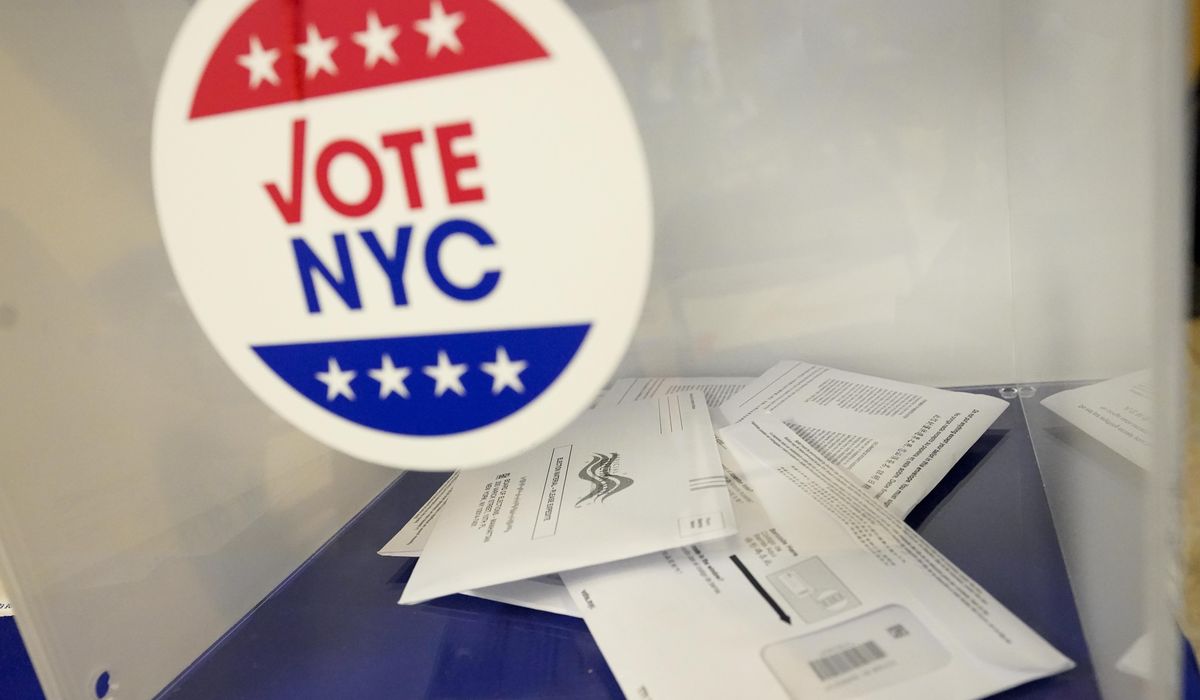
Montpelier City Clerk John Odum chuckled when he was asked how many noncitizens had registered to vote ahead of the Vermont city’s municipal elections in March — the first time they will have the chance to cast ballots.
Not a single person has asked to be signed up, he told The Washington Times earlier this month.
City residents went through a significant ordeal to grant legally present noncitizens the right to vote. They won an amendment to the city charter, got approval from the state legislature and then surmounted a governor’s veto.
Yet with just a few weeks to go, noncitizens don’t seem to have much interest in flexing their new power.
“Right now, we have zero,” Mr. Odum said.
As New York City moves to expand voting rights in local elections to noncitizens, including illegal immigrants, cities that have experimented with the policy have found people don’t rush to sign up.
In Winooski, another Vermont city that begins noncitizen voting this year, Jenny Willingham said no one there has signed up, either. She said the city is about to do some outreach.
“We’re really trying to promote it,” she said.
In San Francisco, which has allowed noncitizen voting in board of education elections for several years, the highest turnout was in 2018, when 59 people on the noncitizen voting list cast ballots. That was a tiny fraction of the nearly 373,000 voters who turned out.
A year later, just two people on the noncitizen roll cast ballots. In 2020, 31 did so.
Federal law is supposed to prohibit noncitizens from registering and casting ballots in federal elections, but state and local governments have no national restrictions within the confines of their own contests.
Some states have proactively barred noncitizen voting, but others have taken permissive approaches.
The policies vary.
In San Francisco, noncitizen voters can cast ballots only in board of education elections, and only if they are parents or caregivers of a juvenile who resides in the city. Illegal immigrants qualify.
In Montpelier, noncitizen voters must have legal status in the U.S., so illegal immigrants are not allowed to cast ballots. Noncitizens can vote on every local issue except for schools. In Winooski, school elections are included.
New York City’s policy, which was allowed to become law early this year and takes effect in 2023, applies to legal permanent residents — green card holders — and to illegal immigrants who have been granted work permits by the Homeland Security Department. That category could include DACA recipients, those in the Temporary Protected Status program and illegal immigrants who have applied for victim visas or asylum.
It is by far the biggest experiment in noncitizen voting that the U.S. has ever seen.
Election officials who spoke with The Times didn’t hazard guesses as to why participation rates have been so low in places where noncitizen voting is allowed.
Some analysts said it could be fear of entanglement with a government agency.
Indeed, San Francisco’s webpage for noncitizen voters contains a stark warning to anyone thinking of signing up: “Any information you provide to the Department of Elections, including your name and address, may be obtained by Immigration and Customs Enforcement (ICE) and other agencies, organizations, and individuals. In addition, if you apply for naturalization, you will be asked whether you have ever registered or voted in a federal, state, or local election in the United States. You may wish to consult with an immigration attorney, an organization that protects immigrant rights, or other knowledgeable source before providing any personal information to the Department of Elections and before registering to vote in San Francisco Board of Education Elections.”
The warning is repeated in 50 languages.
J. Christian Adams, who runs the Public Interest Legal Foundation, dedicated to voter integrity measures, said noncitizens may have inertia when it comes to voting, but experiments like New York’s are intended to break down those barriers and normalize rights for noncitizens.
“The more they desensitize and legitimize illegal aliens voting, eventually the fear goes away,” he said. “The long play here is to alter the cultural inhibitions on registration.”
With the federal prohibition in place, jurisdictions that allow noncitizen voting must keep second voter rolls with the noncitizens’ names to ensure they don’t get mixed in with the rolls for elections for national office.
New York City has tested these waters.
The city allowed any parent who had children in public schools to vote in community school board elections from 1969 to 2002, said Ron Hayduk, a political scientist at San Francisco State University who tracks noncitizen voting.
The professor even found some elections in which noncitizen voters turned out en masse and likely swayed outcomes.
One was the school board contest in the predominantly Dominican neighborhood of Washington Heights in 1986. Mr. Hayduk said turnout hit 10,000 parents, most of them immigrants, and they installed a pro-immigrant majority on the board, including the first Dominican to win election in the U.S.
Mr. Hayduk’s research found that when people focus on mobilizing noncitizen voters, they turn out.
In Hyattsville, Maryland, just over the boundary from the District of Columbia, election officials paid for locally targeted ads in Spanish on Facebook and adopted an all-mail election system, the professor said.
The city-only list of voters — which is where noncitizens would show up, as well as voters ages 16 and 17 — went from 31 names in 2017 to 216 in the 2021 election, and turnout went from 12 in 2017 to 144 last year.
That works out to a 67% turnout rate in 2021, far outstripping the 28% rate overall.
Still, those 144 voters accounted for less than 5% of the total votes cast in the city’s election, even though noncitizens make up about 20% of the city’s population, according to data at TownCharts.com.
Takoma Park, another Maryland city on the D.C. line where about 1 in 6 residents are noncitizens, has allowed them to vote in local elections for decades.
Participation is sparse there too, according to city statistics.
The city has about 13,000 registered voters but only several hundred on the city-only list for noncitizens. Takoma Park has never had more than 100 voters in an election in recent years, City Clerk Jessie Carpenter said.
“The numbers are low,” she said.
Mr. Hayduk said Takoma Park’s turnout was higher in the 1990s but dropped after the 2001 terrorist attacks, “when anti-immigrant sentiment and surveillance grew.”
New York, of course, dwarfs the other jurisdictions, and the chance for an immigrant voting bloc to emerge has elevated the issue.
The Republican National Committee has filed a lawsuit arguing that the city ordinance runs afoul of the New York Constitution, which the RNC said treats the right to vote as a privilege of citizenship.
The RNC last year sued the two Vermont cities. Those lawsuits are pending.
If noncitizens suddenly start to register and vote in significant numbers, it could create other legal problems, Mr. Adams said, such as diluting the strength of current minority voting blocs.
If, for example, Black voters suddenly see hindrances to selecting their preferred candidates in a Democratic primary, that could be a problem under the Voting Rights Act of 1965, Mr. Adams said.
“If New York does this and African Americans are harmed by this, the Public Interest Legal Foundation vows to file a lawsuit under the Voting Rights Act,” he told The Times.







